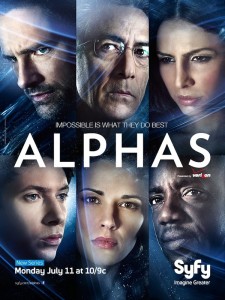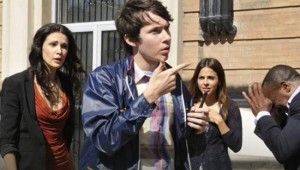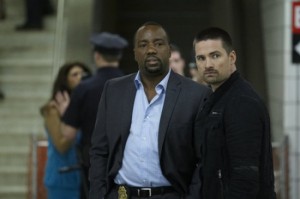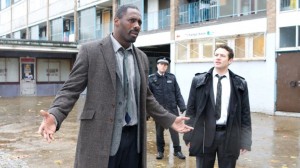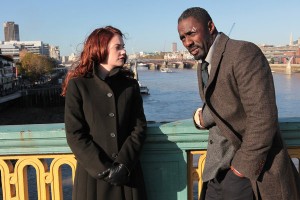There are no particularly meaningful spoilers in this review, though to recap for those looking to go in with a totally blank slate: It’s good, go watch it!
Recently I watched the first season of Alphas, a somewhat modest superhero drama from the SyFy channel that had been popping up in our NetFlix suggestions for some time. I had avoided it because, let’s face it, with a few—ok, maybe only one—standout exceptions like BattleStar Galactica, the SyFy channel is not exactly known for quality. Sharktopus? Mansquito? However, I’m glad I gave it a try.
Plot and Characters
Alphas definitely treads familiar ground. The lead, Dr Rosen, and his team are direct riffs on Dr X and the X-Men. Bill Harken, a more dominant member of the team, is a mini-Hulk that doesn’t turn green. Undoubtedly it all also seems even more familiar to watchers of Heroes or the other superhero ensemble shows of the past few years, none of which I’ve watched. There are in general a fair number of cliches and fairly standard plot setups.
However, Alphas is just different enough to remain interesting, in large part because of its focus on the human experience. This is captured well by one of the taglines: Super but human. Again, this is ground well covered by others, but I think it’s a rich enough space to keep exploring. Refreshingly, although more and more action creeps in as the season goes along, Alphas sticks decidedly toward the simpler, more understated end of the spectrum in terms of superhero powers and special effects. This helps keep the real thrust of the series focused on the team and the interactions between both themselves and the outside world.
Plot-wise, the first episode didn’t really hook me in, but the overall story started to take hold in the second one. At that point it sets off on what seems the planned main arc of the first couple seasons: The tensions and seemingly inevitable conflict between normals and alphas. So far this plot has been done with an even enough hand that it’s interesting without being overdramatic, a definite risk with these kinds of paradigm change, government conspiracy type stories. Alphas also manages to not wear this plot thread thin despite it also being a major theme of really solid previous work like Straczynski’s (excellent) Rising Stars and Supreme Power comic book lines. Starting with that second episode it starts to build a nice air of foreshadowing and building apocalypse that I think works well. I particularly liked the fairly original, nicely done set piece for a major turn in this story arc at the very end of Season 1, and the Marcus and Anna characters hinting at the storm to come in earlier episodes.
Diversity
Notably, and great to see, Alphas does a good job incorporating a lot of diversity without making a big deal of it. Of the main team of six, two are women, one is black, one is Indian, and one a functional autistic. At face value this is great, though it’s diminished a bit by them being very standard: Of course the black guy is the super strong, more combative one; the one woman’s power is manipulating people and she’s fairly materialistic on the surface; the other, Indian, woman’s superpower is listening, and fighting off arranged weddings; the autistic is obviously the computer whiz. However, the mere fact that all these demographics are there in primary characters puts Alphas in a better place than standard whitebread American TV.
Better, those shortcomings are countered by a lot of diversity and non-traditional representations among the larger pool of characters. Women are handled especially well. A big part of the success of recent superhero movies is that they’ve actually managed to do a good job of appealing to women audiences through relatively strong female characters, and Alphas fits right in with that. Pretty much all of the women characters are clearly supposed to be at least attractive, if not hot, but so are all the dudes. More importantly, none of them are overly sexualized and none at all come across as helpless, shrill, or other traditional female characterizations. Of the team’s two main liaisons with the government, the ranking one is a woman who seems nothing but competent. One of the more dangerous assassins the team faces is a woman who relies on speed, tactics, and invisibility to fight, which works well in terms of having women-specific fighting styles. Three other sympathetic “bad guys,” a significant portion of the show, are both female and hyper geniuses.
Other groups also make out well. The other government liaison is a black man with potentially complex moral standing and a few pretty good scenes so far. Two main characters have mental disabilities: Gary on the main team is autistic while Anna, one of the key “villains,” has apraxia (an inability to move). Gary is probably actually the hidden star of the show as he is largely the most compelling to watch. I can’t immediately think of any other TV show that has given such positive, prominent placing to characters with those sorts of handicaps.
Summary
Alphas is pretty low key, and I think it’s one of those cases were less is more. By operating under a comparatively restricted budget, they’ve been forced to focus a bit more on characters rather than effects, and kept to a fairly understated approach. It probably won’t blow anyone away, but by the end of the first season I was really enjoying it. Importantly, that focus on characters and the diversity of them means that it’s probably fairly appealing to those who would not otherwise be particularly interested in science fiction or superheroes.
The first season, comprising eleven episodes, is available streaming on NetFlix. Another five from the start of the second season are available to stream from the SyFy channel website right now. Go check it out!
Sidenote: “The SyFy Channel” remains and will remain a really stupid, disappointing name change.
UPDATE: I realized later that Walt Jr in Breaking Bad is of course another currently prominent handicapped character. I’ll have to think about that some more. He’s not active as a character in the same way as those here, though he’s a good character well played, and one of the very few positive, “good” characters in that show.
